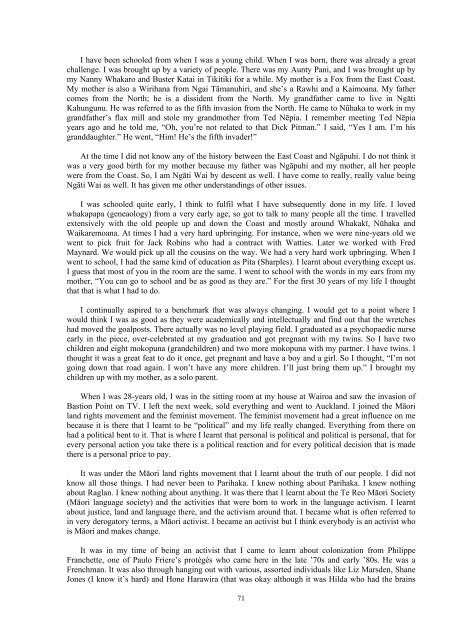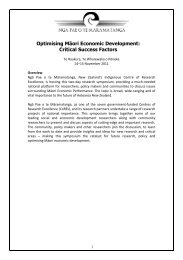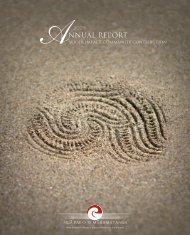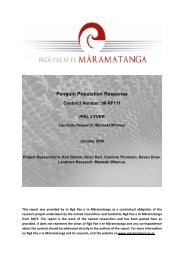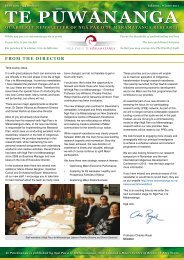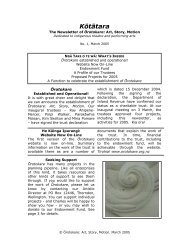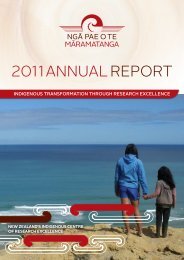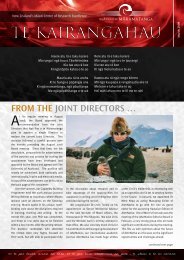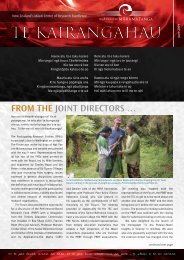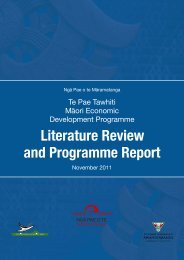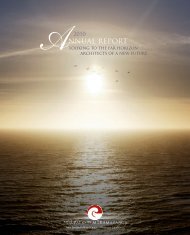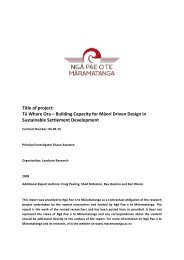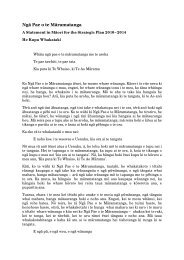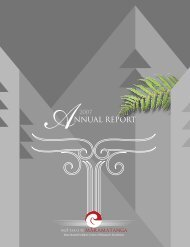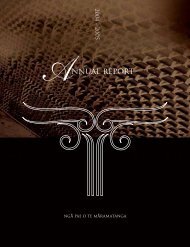traditional knowledge conference 2008 te tatau pounamu
traditional knowledge conference 2008 te tatau pounamu
traditional knowledge conference 2008 te tatau pounamu
You also want an ePaper? Increase the reach of your titles
YUMPU automatically turns print PDFs into web optimized ePapers that Google loves.
I have been schooled from when I was a young child. When I was born, there was already a greatchallenge. I was brought up by a variety of people. There was my Aunty Pani, and I was brought up bymy Nanny Whakaro and Bus<strong>te</strong>r Katai in Tikitiki for a while. My mother is a Fox from the East Coast.My mother is also a Wirihana from Ngai Tāmanuhiri, and she’s a Rawhi and a Kaimoana. My fathercomes from the North; he is a dissident from the North. My grandfather came to live in NgātiKahungunu. He was referred to as the fifth invasion from the North. He came to Nūhaka to work in mygrandfather’s flax mill and stole my grandmother from Ted Nēpia. I remember meeting Ted Nēpiayears ago and he told me, “Oh, you’re not rela<strong>te</strong>d to that Dick Pitman.” I said, “Yes I am. I’m hisgranddaugh<strong>te</strong>r.” He went, “Him! He’s the fifth invader!”At the time I did not know any of the history between the East Coast and Ngāpuhi. I do not think itwas a very good birth for my mother because my father was Ngāpuhi and my mother, all her peoplewere from the Coast. So, I am Ngāti Wai by descent as well. I have come to really, really value beingNgāti Wai as well. It has given me other understandings of other issues.I was schooled qui<strong>te</strong> early, I think to fulfil what I have subsequently done in my life. I lovedwhakapapa (geneaology) from a very early age, so got to talk to many people all the time. I travelledex<strong>te</strong>nsively with the old people up and down the Coast and mostly around Whakakī, Nūhaka andWaikaremoana. At times I had a very hard upbringing. For instance, when we were nine-years old wewent to pick fruit for Jack Robins who had a contract with Watties. La<strong>te</strong>r we worked with FredMaynard. We would pick up all the cousins on the way. We had a very hard work upbringing. When Iwent to school, I had the same kind of education as Pita (Sharples). I learnt about everything except us.I guess that most of you in the room are the same. I went to school with the words in my ears from mymother, “You can go to school and be as good as they are.” For the first 30 years of my life I thoughtthat that is what I had to do.I continually aspired to a benchmark that was always changing. I would get to a point where Iwould think I was as good as they were academically and in<strong>te</strong>llectually and find out that the wretcheshad moved the goalposts. There actually was no level playing field. I gradua<strong>te</strong>d as a psychopaedic nurseearly in the piece, over-celebra<strong>te</strong>d at my graduation and got pregnant with my twins. So I have twochildren and eight mokopuna (grandchildren) and two more mokopuna with my partner. I have twins. Ithought it was a great feat to do it once, get pregnant and have a boy and a girl. So I thought, “I’m notgoing down that road again. I won’t have any more children. I’ll just bring them up.” I brought mychildren up with my mother, as a solo parent.When I was 28-years old, I was in the sitting room at my house at Wairoa and saw the invasion ofBastion Point on TV. I left the next week, sold everything and went to Auckland. I joined the Māoriland rights movement and the feminist movement. The feminist movement had a great influence on mebecause it is there that I learnt to be “political” and my life really changed. Everything from there onhad a political bent to it. That is where I learnt that personal is political and political is personal, that forevery personal action you take there is a political reaction and for every political decision that is madethere is a personal price to pay.It was under the Māori land rights movement that I learnt about the truth of our people. I did notknow all those things. I had never been to Parihaka. I knew nothing about Parihaka. I knew nothingabout Raglan. I knew nothing about anything. It was there that I learnt about the Te Reo Māori Society(Māori language society) and the activities that were born to work in the language activism. I learntabout justice, land and language there, and the activism around that. I became what is of<strong>te</strong>n referred toin very derogatory <strong>te</strong>rms, a Māori activist. I became an activist but I think everybody is an activist whois Māori and makes change.It was in my time of being an activist that I came to learn about colonization from PhilippeFranchet<strong>te</strong>, one of Paulo Friere’s protégés who came here in the la<strong>te</strong> ’70s and early ’80s. He was aFrenchman. It was also through hanging out with various, assor<strong>te</strong>d individuals like Liz Marsden, ShaneJones (I know it’s hard) and Hone Harawira (that was okay although it was Hilda who had the brains71


